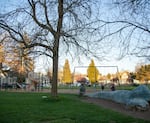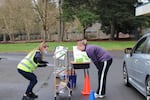Late last month we published a story with some resources to help parents and guardians who suddenly found themselves filling the role of their children's teacher. We hope you found the first set of resources helpful, as you try to engage and educate the kids who would normally be at school.
Related: With Oregon Schools Likely Closed For The Year, Officials Shift To 'Distance Learning For All'
Since that article was published, the Oregon Department of Education has shifted its expectations from optional supports termed "supplemental learning" during the closure, to required plans it's calling "Distance Learning For All." But, uncertainty remains as to what "distance learning" will look like at different schools, and how long your kids will be out of school.
But one thing is clear: even when school plans are done (the deadline is April 13), the instruction time requirements are unlikely to fill your child’s entire day. For primary grades, ODE is expecting up to 60 minutes; for upper elementary, it’s 90 minutes; and for middle and high schoolers, it’s three hours (30 minutes per subject).
If you feel like your child could use more learning support than that, we’d welcome you to look to this series of articles for resources.
In the first installment, we provided links to important FAQs from the Oregon Department of Education and some “need-to-know” essentials from school districts about education in the time of the coronavirus. And we included “special education” resources and “online learning staples.” Today, we cover a few specific learning areas.
Health and physical education
One of the biggest challenges of the coronavirus school hiatus is simply keeping kids healthy and active. If access to healthy food is an issue, you should know that Gov. Kate Brown’s executive order closing schools required them to continue providing lunches. Check with your district to find out where you can find lunches for your youngsters.

Children in the play area of a closed school in Portland, Ore., on Thursday, March 19, 2020.
Claudia Meza / OPB
Related: Are You Suddenly Your Child's Teacher? You’re Not Alone. Here’s Help.
As an Oregonian you know keeping kids active can be especially challenging if it’s rainy outside. It can be difficult, but it’s not impossible.
The Society of Health and Physical Educators, Shape America, will help get your kids moving and maybe you, too! The Beaverton School District offers Brain Boost. The site offers workouts the district hopes will appeal to kids, with themes like "Black Panther" and "Star Wars."
Joe Wick, the Body Coach teaches kids phys-ed with workouts they can do at home. He must be doing something right since his videos routinely get more than 2 million views.
And when it comes to children's mental health – you might check out Yale's Happiness Course.
If you like that, your family might appreciate an interview with the course creator, who just happens to be featured in an upcoming PBS series produced by OPB called "Hacking The Mind" scheduled to air this July 2020.
Social studies and history
There’s a wealth of online resources to dig deeper into social studies and history, often with an emphasis on civil rights and historically underrepresented populations.
You may have heard the segment on "Think Out Loud" recently on Asian American harassment. OPB has reported on xenophobia and bias from a student perspective in Oregon schools as COVID-19 became a global and local issue. This type of reaction during a crisis isn't new. Learn the history of Oregon Japanese Americans during WWII on "Oregon Experience." Then check out The Conscious Kid, which aims to connect kids to books and stories with a goal of "reducing bias and promoting positive identity in youth."

Third grade teacher Jessica Neal helps a parent choose a few books to bring home. Along with laptops, the staff at Rock Creek Elementary in Beaverton provided supplies to help their students continue their lessons while staying at home.
Steven Tonthat / OPB
The web site Teaching Tolerance has whole sections focused on religion, race & ethnicity, immigration and gender & sexual identity. It also has articles focused on teaching in the era of coronavirus.
Related: Oregon High School Students Reflect On Coronavirus And Xenophobia
The National Civil Rights Museum web site offers a virtual tour of the National Civil Rights Museum located in Memphis, Tennessee. The museum presents a timeline of the civil rights struggle relating to African Americans and concentrating on the seminal events of the 1950s and 1960s. including Brown vs. the Board of Education. The U.S. Holocaust Museum confronts hatred strengthening democracy, the Oregon Jewish Museum and Center for Holocaust Education also offers instruction focused around the holocaust and Jewish history.
The Confluence Project connects you to the history, living cultures, and ecology of the Columbia River system through Indigenous voices of the Northwest.
iCivics provides citizenship literacy, presented in a range of ways — from games to mini-lessons at middle and high school levels.
Several sites offer you and your student the opportunity to play student-archivist, opening up troves of material. Check out The Library of Congress, Oregon Historical Society, and the Newseum with its online collection of tools and interactives focused on the First Amendment and media literacy. If you just can't get enough of primary sources (by now, your kid is going to know what a primary source is), you should probably just check out the National Archives and Records Administration.
If all of these sites make you wonder what goes into creating a history curriculum, the National Center for History in the Schools is where you can learn more about standards and access to teaching materials.
When you're ready to put down the documents and curriculum and focus on the "story" part of "history," check out PBS – History Detectives and its activities for students to solve mysteries with their own primary sources. And the National Museum of American History includes additional activities for families.
Check back for more resources on additional subjects in the days ahead.
Editor's note: This story has been updated to correct the location of the National Civil Rights Museum.